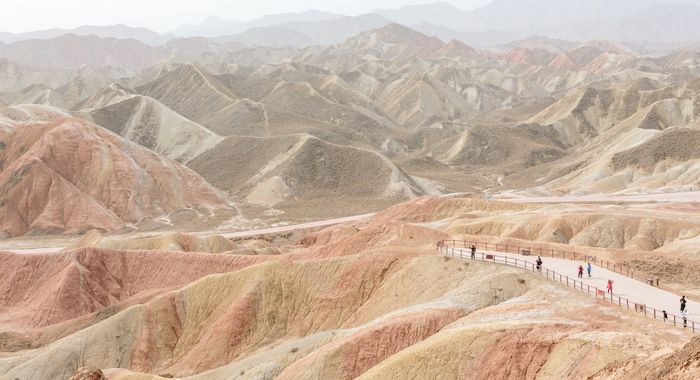Journalism // Anarchy in the USA (SUITCASE Magazine Vol. 30)
Working in partnership with the tourist board, I arranged a trip for myself and photographer Kate Berry to the the US city of Portland, Oregon to explore how its liberal-minded attitude towards sustainability and creativity might provide a blueprint for other cities worldwide, as well as creating an itinerary and guide to the best places to stay, eat, shop and drink. I interviewed punk-rock vegan chefs, weed-focused magazine editors, record store owners and fashion mavericks in order to draw an outline of Portland's specific spirit of productive anarchy. The final article was published in the spring 2020 issue of SUITCASE Magazine, a few months before the widespread protests in the city begun.
“Go on, try and reach all the way around!” I obediently press myself against the vast, furry trunk, bark scratching my chin and wilful, lime-green moss springing into my nostrils. I’ve only been in Portland for a few hours, yet already I’m hugging a tree. Given the city’s reputation as a haven for hippies and hipsters, it’s a hilariously on-the-nose introduction in more ways than one.
The double “hip” label both reveals and conceals the reality of life in Oregon’s largest city. On the one hand, it fondly acknowledges Portland’s open embrace of concepts beloved of both tribes, such as sustainability, liberal thinking and DIY creativity. In addition to mandating limits on urban sprawl, creating hundreds of miles of bike paths and hiking trails and establishing the US’s largest forested park within city borders, this is a place where a historical combination of low rents, a supportive community and spirit of open-mindedness has allowed grassroots businesses to thrive and individuals to pursue their wildest ideas.
It’s also true that this cocktail of feel-good philosophies has led to Portland being perceived as a kind of urban utopia, characterised by an abundance of drip-coffee bars, feminist bookstores and men in plaid shirts. This view can run close to satire, as depicted in the TV series Portlandia, Fred Armisen and Carrie Brownstein’s affectionate send-up of “a place where the tattoo ink never runs dry”. Admittedly, when a friend who recently moved here tells me of an accident she had when her fairy lights got caught in the rear wheel of her fixie on the way back from a neon, pop-up, food-cart night market, I can’t help but stifle a giggle at the Portland-ishness of it all.
However, to cast off the city as a kind of quirky cousin to America’s more serious-minded centres of commerce is perhaps a mistake in our current climate of cynicism, political trauma and eco-anxiety. Portland may be idealistic, but it is neither utopic nor isolated – as well as facing the same global issues around climate change and national political schisms, the city is going through its own difficult period of rapid growth and the attendant problems of gentrification and adjustment, with the population due to surge by 40 per cent by 2035 and a housing emergency already declared. Yet Portland’s long-standing, fierce belief in its residents’ capacity to solve problems, as well as its dedication to balance, nature and self-expression, may be just what we need to heal both ourselves and our ailing planet.
From one kind of green and blissed-out to another, we head back into town to meet Anja Charbonneau, the former creative director of Kinfolk Magazine and founder of the cannabis-focused magazine Broccoli. Oregon is one of 11 US states that has legalised the recreational use of marijuana – although visitors should be aware that while they can buy the drug from any of the dispensaries that dot the streets, consumption on public property is not yet legal – and Anja is one of a growing charge of entrepreneurs and creatives keen to explore its potential.
“Rather than just focusing on cannabis, our philosophy is about embracing curiosity and sensitivity,” she explains. “When we started, cannabis had been legal in Oregon for a couple of years – lots of thoughtful brands were starting businesses and people were beginning to have intelligent conversations, yet there were still just ‘stoner bro’ magazines on the shelves. I knew that there would be a community behind me, so it felt like the right time.” The result is a psychedelic yet sophisticated tome veering between subjects including forgotten women musicians of the past, the role of the endocannabinoid system and Mexican vintage shops.
We round off the day in the candlelit, fern-heavy surrounds of Farm Spirit, a fine-dining vegan restaurant focusing on “Cascadian cuisine” wholly sourced from farms or farmers’ markets within 105 miles. Tattooed waiters pirouette around us while beanie-hatted chefs rustle up a six-course tasting menu of delicate slices of glistening beetroot sandwiched with cream and sprinkled with mustard seeds; an unctuous, green-wheat porridge with apple, black-garlic butter and radishes shaped like flowers; and a kind of deconstructed roast dinner using chanterelle mushrooms instead of meat. The next morning, we sit down with owner and chef Aaron Adams at Fermenter, his more accessible offshoot diner that serves nine-dollar “meatloaf” and fermented produce to casual counter seats.
I find another rebellious character in the hipster hinterlands around North Mississippi Avenue, where Eric Isaacson holds court behind the counter at his record store, Mississippi Records. “I’m stubborn and ridiculous,” Eric laughs, as he recounts how he had the “best intentions to fail” when he started out in 2003 with $5,000 in savings and $5 cash in the till. Today his shop stocks records that are “meant to reflect the culture of the neighbourhood” from both around the world and Eric’s own label, which represents many Portland-based artists.
“We’re probably a terrible label as we do no promo, but it works in the esoteric circles that know about us. We give a lot of people their start,” he explains, as we browse vinyl by 81-year-old soul singer Ural Thomas and 90s punk legends Dead Moon, whose bass player Toody Cole runs a thrift store in the basement. Having started his business at a time when the spotlight wasn’t yet on the city, I ask Isaacson if he thinks Portland still supports this kind of grassroots endeavour. “I don’t know if I could start this thing now. I’ve been lucky with the opportunities I’ve been afforded, but the city is changing – there’s plenty of culture left, but you have to look between the cracks,” he answers. “Portland does like to support quirky and eccentric stuff, but I definitely get the blues when my friends are forced to move further out.”
Spending time in the fertile surrounds of the Oregon countryside in such close proximity to the city helps me to understand Portland’s chefs’ obsession with sustainable, farm-to-table dining that respects its provenance. That night we dine in the sea-scented surrounds of Erizo, young chef Jacob Harth’s 20-seat restaurant that serves lesser-known invasive species, such as purple sea urchin and gooseneck barnacles, in an effort to create new, sustainable marketplaces. Each previously unused or unloved ingredient is presented reverently, from the skewers of smoky giant Pacific octopus and spiny dogfish to the icy platter of finely sliced horseneck and butter clams and the delectable barbecued chub mackerel with pillowy bread and sharp anchovy dressing.
Jacob tells me about how he and co-owner Nick Van Eck go foraging once a week along the Oregon coast, as well as building relationships with local fishermen and battling with the wider food community to persuade them to accept his ideas. “We’re not trying to make money; we just want to highlight indigenous species that are abundant,” he says. “We don’t want to take away from nature, but instead help it where it’s struggling. We want the restaurant to be a showroom for a bigger audience.” And in many ways, this is modern Portland in a snap: vehement, quietly revolutionary and with a punk-rock spirit set on shaking up the system.

